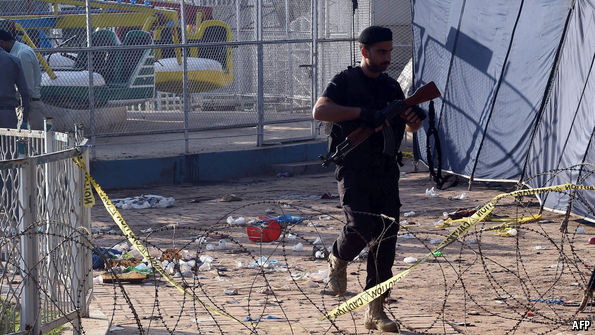A bombing in Lahore underscores the challenges of confronting extremism
Carnage in Pakistan as the religious right fights back

MEMBERS of Pakistan’s security establishment who are charged with keeping order in Punjab, the country’s biggest province, have in recent weeks trumpeted their successes against religious militancy and extremism. Entire groups had been “eliminated”, senior police officers assured journalists recently. That claim was sorely tested by an atrocity in Lahore, the capital of Punjab, on March 27th.
A suicide-bomber blew himself up at a small amusement park where families had been enjoying a pleasant springtime evening. At least 72 people were killed, most of them women and children, and more than 200 injured. It was probably no coincidence that many of the victims were from Pakistan’s tiny Christian minority, who had gone out to celebrate with their families after attending Easter Sunday church services. A breakaway faction, Jamaat ul-Ahrar, of Tehreek-e-Taliban Pakistan or the Pakistani Taliban, claimed responsibility. “We have entered Lahore,” it crowed.
Massacres of civilians are sadly common in Pakistan, but not in Punjab. Lahore, the hometown of the prime minister, Nawaz Sharif, is normally peaceable. Many from Pakistan’s civilian and military elites hail from Lahore or other parts of Punjab, a province of 110m and the country’s most influential. Lahore has only ever suffered a fraction of the violence that terrorists have rained down upon the north-western city of Peshawar, for example, and its nearby tribal belt along the border with Afghanistan.
The blast therefore marks a further escalation in Pakistan’s battle against extremism. In the past Mr Sharif’s ruling Pakistan Muslim League-Nawaz (PML-N) has been suspected of striking deals with various sectarian jihadist outfits operating out of Punjab, particularly in the south of the province near the Indian border. Some of Pakistan’s terror groups had for years been nurtured by parts of the army, which found them useful in agitating in Afghanistan and against India. But in June 2014 Pakistan’s army moved against the Pakistani Taliban’s sanctuaries bordering Afghanistan, leading to a dramatic fall in violence. The campaign was expanded into an ambitious “national action plan” against extremism, following the massacre in December 2014 of around 130 schoolchildren in Peshawar. More than anything, that massacre convinced many Pakistanis that the terror fostered in their midst needed to be confronted.
The extremists will not go quietly. On the same day as the Lahore bombing, ominous protests took place in Islamabad, the Pakistani capital. There tens of thousands gathered to remember Mumtaz Qadri, a former police bodyguard who in 2011 gunned down his charge, Salman Taseer, the governor of Punjab. Qadri said he had killed the liberal-minded Taseer because of the governor’s stance against the country’s harsh blasphemy laws. He was hanged for the offence in late February. His supporters remain angry. Several hundred fought past police firing tear gas and set up camp outside Parliament. Along the way they torched new bus stations built at huge expense as part of a government infrastructure project. An assembly of radicals proceeded to issue a series of demands, including the immediate imposition of sharia law. The protests in Islamabad were unconnected with the carnage in Lahore. But both events underscore a grim certainty: now that he is taking the fight to Pakistan’s religious right, Mr Sharif can be sure that it will fight back.

No comments:
Post a Comment